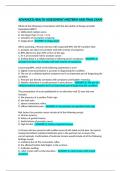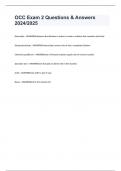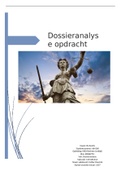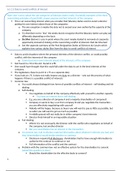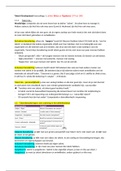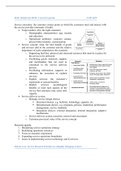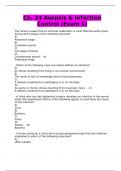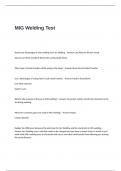Which of the following is inconsistent with the description of benign prostatic
hyperplasia (BPH)?
A. obliterated median sulcus
B. size larger than 2.5 cm × 3 cm
C. sensation of incomplete emptying
D. boggy gland - ANSWER: D. Boggy gland
When assessing a 78-year-old man with suspected BPH, the NP considers that:
A. prostate size does not correlate well with severity of symptoms.
B. BPH affects less than 50% of men of this age.
C. he is at increased risk for prostate cancer.
D. limiting fluids is a helpful method of relieving severe symptoms. - ANSWER: A.
prostate size does not correlate well with severity of symptoms.
Concerning BPH, which of the following statements is true?
A. Digital rectal examination is accurate in diagnosing the condition.
B. The use of a validated patient symptom tool is an important part of diagnosing the
condition.
C. Prostate size directly correlates with symptoms and bladder emptying.
D. Bladder distention is usually present in early disease. - ANSWER: B. The use of a
validated patient symptom tool is an important part of diagnosing the condition.
The presentation of acute epididymitis in an otherwise-well 22-year-old man
includes:
A. the presence of a positive Prehn sign
B. low back pain.
C. absent cremasteric reflex.
D. diffuse abdominal pain. - ANSWER: A. the presence of a positive Prehn sign
Risk factors for prostate cancer include all of the following except:
A. African ancestry.
B. history of genital trauma.
C. family history of prostate cancer.
D. high-fat diet. - ANSWER: B. history of genital trauma.
A 24-year-old man presents with sudden onset of left-sided scrotal pain. He reports
having intermittent unilateral testicular pain in the past but not as severe this
current episode. Confirmation of testicular torsion would include all of the following
findings except:
A. unilateral loss of the cremasteric reflex.
B. the affected testicle held higher in the scrotum.
C. testicular swelling.
D. relief of pain with scrotal elevation. - ANSWER: D. relief of pain with scrotal
elevation.
,In assessing a man with testicular torsion, the NP is most likely to note:
A. elevated PSA level.
B. white blood cells reported in urinalysis.
C. left testicle most often affected.
D. increased testicular blood flow by color-flow Doppler ultrasound. - ANSWER: C.
left testicle most often affected
Which is the most potent risk factor for PVD?
A. HTN
B. older age
C. cigarette smoking
D. leg injury - ANSWER: C. cigarette smoking
Typically, the earliest sign of venous insufficiency is:
A. edema
B. altered pigmentation
C. skin atrophy
D. shiny skin - ANSWER: A. edema
What is the "lub" or the S1 sound? - ANSWER: Closure of the AV valves
Beginning of systole
What is the "dub" or the S2 sound? - ANSWER: Closure of the semi lunar valves
End of systole
Where is the S1 the loudest? - ANSWER: APEX
"S1=1=A" (a for apex!)
Where is the s2 the loudest? - ANSWER: BASE
"S2=2=B" (b for base)
What is the order of examination for the abdomen? - ANSWER: Inspection
Auscultation
Percussion
Palpation
OLDCARTS.
O
What question would you ask? - ANSWER: O: onset
-when it started
OLDCARTS.
, L
What question would you ask? - ANSWER: L: location
-where the pain/problem is at
OLDCARTS.
D
What question would you ask? - ANSWER: D: duration
- how long the patient has had the pain
OLDCARTS.
C
What question would you ask? - ANSWER: C: character
- what is the pain like or description of the pain
OLDCARTS.
A
What question would you ask? - ANSWER: A: alleviating/aggravating factors
- what makes the pain feel better or worse?
OLDCARTS.
R
What question would you ask? - ANSWER: R: reliving factors or radiation
- what makes the pain better?
OLDCARTS.
T
What question would you ask? - ANSWER: T: timing
- does the pain feel better during certain times of the day and worse others?
OLDCARTS.
S
What question would you ask? - ANSWER: S: severity
- how bad is the pain on a scale of one to ten?
S1 (systole) heart sound occurs when? - ANSWER: Closure of the mitral and tricuspid
valves. AV valves
S2 (diastole) heart sound occurs when? - ANSWER: Closure of the aortic and
pulmonic valves
What is the most common cause of a systolic ejection murmur in the elderly? -
ANSWER: Aortic stenosis
What is a HEAVE - ANSWER: Heave: A heave can be palpated over the precordium
and feels like an abnormally large heartbeat. It is a sign of left ventricular
hypertrophy.

